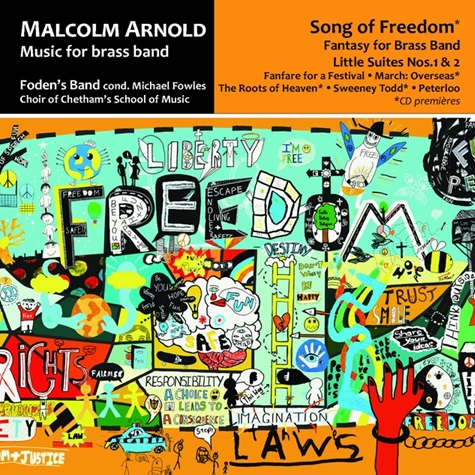

Foden’s Band
Conductor: Michael Fowles
Choir of Chetham’s School of Music
Choir Director: Marcus Farnsworth
Beckus: MAF 003
The complexities of Malcolm Arnold’s life were many and varied. So too his musical gifts.
On his death in 2006 it was said he was a composer whose time was still waiting to come. Arguably that is no longer true, although this outstanding CD will certainly help in completing the journey.
His lack of compromise to categorisation (influences ranging from Berlioz to swing jazz, links from classical concertos to Deep Purple), brought with it cycles of grudging establishment admiration set against extended critical disapproval and abrasive neglect - notably from the BBC under its Controller of Music, Robert Ponsonby.
Popularity with audiences never waned though - an affection maintained from the early ‘St Trinian’ films to the trio of David Lean associations of ‘The Sound Barrier’, ‘Hobson’s Choice’ and the Academy Award winning ‘Bridge on the River Kwai’.
Character complexities
Despite his own brittle appreciations of love and friendship, he retained support – notably the critic Hans Keller who perceptively identified the deep character complexities found in his music, and Sir William Walton.
It was he who remarked when Malcolm Williamson was appointed Master of the Queen’s Music in 1975, that they had chosen “the wrong Malcolm.”
Despite his own brittle appreciations of love and friendship, he retained support – notably the critic Hans Keller who perceptively identified the deep character complexities found in his music, and Sir William Walton.
By then Arnold’s life was in a spiral of self-destructiveness, (perhaps accounting for the missed opportunity of ‘Fantasy for Brass Band’); one that was to be saved and extended by happenchance and immense care.
It also enabled him to eventually enjoy a long overdue appreciation of his masterful ‘Fifth Symphony’ and deeply affecting ‘Ninth’.
In 1991 (with Ponsonby gone) the BBC celebrated his 70th birthday, followed by his 80th with a more considered appreciation. His final years, although devoid of new work, saw an almost complete rehabilitation. He was knighted in 1993.
Cultured authority
This superb release, led and performed with cultured authority, also draws a candid musical appreciation of the deeper complexities found in his brass band output.
Michael Fowles and Foden’s lift the surface veneer of easy melodicism and boisterous exuberance (shown with the early 1950s Elizabethan optimism of ‘Fanfare for a Festival’ and St Trinianesque wit of the march ‘Overseas’) to reveal the deeper, much darker tensions of despair, bitterness, loneliness and self-destruction found below.
It also sits in stark contrast to his earlier writing for youth bands, of which the ‘Little Suites’ from 1963 and 1967 were composed without deference to age or musical maturity.
However, despite even their finely attuned appreciations, ‘Fantasy for Brass Band’ is a mood mix that cannot be successfully resolved to a greater whole. At its heart the ‘Elegy’ remains a chilling, tragic interlude (by 1973 a rapidly declining and isolated Arnold was living in Dublin) but one surrounded by old ideas.
It also sits in stark contrast to his earlier writing for youth bands, of which the ‘Little Suites’ from 1963 and 1967 were composed without deference to age or musical maturity. As a result, they remain miniature gems of ageless craftsmanship – deceptively simple in form, yet richly varied in character.
Stark pertinence
So too the central ‘Song of Freedom’ (1972) with a libretto written by youngsters experiencing first-hand the crumbling of exciting 1960’s optimism, but which retains a stark pertinence in the post millennium era.
Arnold provides an unpatronising canvas to aid the directness of the words in leaping out at you like the messages on the CD cover (reminiscent of the 1970s art of Jean-Michel Basquiat, but actually from a 2016 Bristol schools project).
Fittingly, given the battles of his own life, the release closes with the ‘Overture: Peterloo’ - a visceral amalgam of hope and bloodied intransigence leading to historical redemption.
Redemption
In contrast there is an oddness (and very much of its time) to the message of freedom that Arnold had to reflect in the score to the 1958 film, ‘The Roots of Heaven’.
Ostensibly about elephant poaching in French Equatorial Africa, not even a colourful highlights ‘overture’ could save it from cinematic extinction; the music rather reflecting the opinion of director John Huston that it “could have been a very fine film. And largely owing to me was not a good film at all.”
Philip Littlemore’s neatly realised suite of some of the ballet music to ‘Sweeney Todd’ is a delight (itself a shortened version of concert suite by David Ellis); a mix of gory farce and the darker forces of deception and murder.
Fittingly, given the battles of his own life, the release closes with the ‘Overture: Peterloo’ - a visceral amalgam of hope and bloodied intransigence leading to historical redemption.
Iwan Fox
To purchase: https://the-malcolm-arnold-society.sumupstore.com/products
Play list:
1. Fanfare for a Festival (1955)
2. March: ‘Overseas’ Op.70 (1960)
3. The Roots of Heaven: Overture (1958)
4. Little Suite No.2 for Brass Band Op.93 (1967)
i. Round
ii. Cavatina
iii. Galop
7. Fantasy for Brass Band Op.114 (1973)
8. Song of Freedom Op.109 (1972)
i. Prelude
ii. Hymn
iii. Intermezzo
iv. Postlude
12. Little Suite No.1 for Brass Band Op.80 (1963)
i. Prelude
ii. Siciliano
ii. Rondo
15. Sweeney Todd: Ballet Op.68 (1959)
16. Peterloo: Overture Op.97 (1967)









